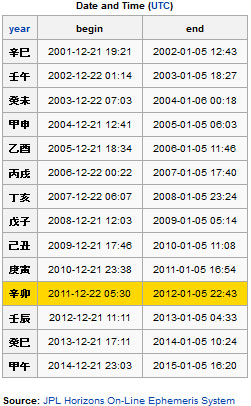 The Winter Solstice Festival (Chinese: 冬至; Pinyin: dōng zhì; “The Extreme of Winter”) is one of the most important festivals celebrated by the Chinese as well as other East Asians during the dongzhi solar term. The traditional Chinese calendars divide a year into 24 solar terms (節氣). Dōngzhì (pīnyīn) or Tōji (rōmaji) (Chinese and Japanese: 冬至; Korean: 동지; Vietnamese: Đông chí; literally: “winter solstice”) is the 22nd solar term. It begins when the Sun reaches the celestial longitude of 270° and ends when it reaches the longitude of 285°. It more often refers in particular to the day when the Sun is exactly at the celestial longitude of 270°. In the Gregorian calendar, it usually begins around December 21 (December 22 East Asia time) and ends around January 5th.
The Winter Solstice Festival (Chinese: 冬至; Pinyin: dōng zhì; “The Extreme of Winter”) is one of the most important festivals celebrated by the Chinese as well as other East Asians during the dongzhi solar term. The traditional Chinese calendars divide a year into 24 solar terms (節氣). Dōngzhì (pīnyīn) or Tōji (rōmaji) (Chinese and Japanese: 冬至; Korean: 동지; Vietnamese: Đông chí; literally: “winter solstice”) is the 22nd solar term. It begins when the Sun reaches the celestial longitude of 270° and ends when it reaches the longitude of 285°. It more often refers in particular to the day when the Sun is exactly at the celestial longitude of 270°. In the Gregorian calendar, it usually begins around December 21 (December 22 East Asia time) and ends around January 5th.
The origins of this festival can be traced back to the Yin and Yang philosophy of balance and harmony in the cosmos. After this celebration, there will be days with longer daylight hours and therefore an increase in positive energy flowing in. The philosophical significance of this is symbolized by the I Ching hexagram fù (復, “returning”). Traditionally, the Dongzhi Festival is also a time for the family to get together. One activity that occurs during these get togethers (especially in the southern parts of China and in Chinese communities overseas) is the making and eating of Tangyuan (湯圓, as pronounced in Cantonese; Mandarin Pinyin: Tāng Yuán) or balls of glutinuous rice, which symbolize reunion. Tangyuan are made of glutinuous rice flour and sometimes brightly coloured. Every one in the family receives at least one large Tang Yuan and several small ones. The flour balls may be plain or stuffed. They are cooked in a sweet soup or savoury broth with both the ball and the soup/broth served in one bowl.
In northern China, people typically eat dumplings on dongzhi. It is said to have originated from Zhang Zhongjing of Han Dynasty. On one cold winter day, he saw the poor suffering from chilblains on their ears. Feeling sympathetic, he ordered his apprentices to make dumplings with lamb and other ingredients, distributed them among the poor to keep them warm. Since the dumplings were shaped like ears, Zhang named it “qǜ hán jiāo ěr tāng” or dumpling soup that expels the cold. From then on it became a tradition passed down to eat dumplings on the day of dongzhi to keep the ears from getting chilblains.
Glossary:
Chilblains: are patches of red, swollen and itchy skin, often caused by cold weather and sometimes exacerbated by poor circulation.
Sources:
encyclopedia.thefreedictionary.com/Winter+Solstice+Festival
slybutterfly.multiply.com/journal/item/243/Happy_Dong_Zhi_Winter_Solstice_Festival